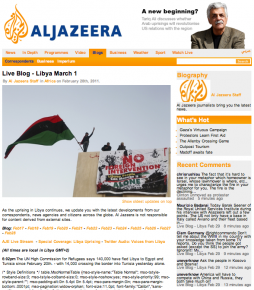New Media
Posted by MelissaUlbricht on Mar 02, 2011
Recent events in Tunisia, Egypt, and Libya have been on the minds -- and on the screens -- of people around the world.
News organizations are covering the events in innovative ways, and people have noticed. More generally, the role of social media itself in protests and revolutions is also being debated. But, as Charlie Beckett writes on his blog, let’s “put aside the silly debate about whether Twitter 'caused' revolution and look instead at how it helped tell the story.” Twitter is just one platform being used to help tell the story, as we see from our conversation with Al Jazeera, one of the most innovative newsrooms in the mix.
Posted by AnneryanHeatwole on Nov 04, 2009
Briefing: Twitter against Tyrants - New Media in Authoritarian Regimes data sheet 2319 Views
Author:
Transcript of a briefing. Witnesses: Daniel Calingaert, Nathan Freitas, Evgeny Morozov, Chris Spence, Chiyu Zhou
Abstract:
The Helsinki Commission is an organization monitoring the implementation of the Helsinki Accords, the Helsinki Final Act across 56 participating states. The Commission monitors freedom of media. This briefing considers the ways in which new media and Internet communication technologies affect the balance of power between human rights activists and authoritarian governments. Panelists focus on new media’s role in protests and elections, the ways in which it empowers civil society activists, and the darker side: how dictators use new technology to control and repress their citizens.
Posted by PrabhasPokharel on Aug 17, 2009
The Role of New Media in the Iranian Elections data sheet 2472 Views
Author:
Center for International Media Assistance
Abstract:
New media technologies played a major role in the events leading up to and following the 2009 Iranian elections and are likely to continue to have a tremendous impact. Social networking tools such as Twitter, Facebook, and blogging have changed the way Iranian citizens communicate with each other as well as with the outside world. From cell phone cameras capturing scenes of violence that otherwise would go unreported to Twitter feeds used to organize massive protests, new media have forever changed the nature of citizen participation, not just in Iran, but throughout the world.
Despite the impact of these technologies during the Iranian elections, relatively little definitive information has been gathered about their specific role in the elections and subsequent protests. What are the implications of these new technologies for democracy in Iran? How have both the opposition and the government used these new tools against each other in what some call an “Internet battlefield”? Do the users of new media adequately represent the Iranian population? How has the Iranian government attempted to censor or curb the use of these new tools?
In presentations and discussions during a panel discussion held by the Center for International Media Assistance (CIMA), new media practitioners, Iran specialists, and interested observers attempted to clarify the role of new media in the Iranian elections and the implications of these technologies for future democratic movements.
